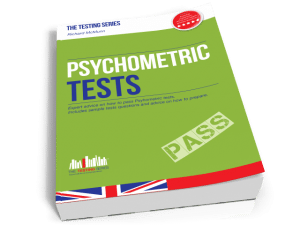If you are familiar with the term job selection process, you are probably familiar with the term psychometric testing. If not, you should be! Psychometric testing is a commonly used way for employers to measure how well you can perform in a job role. Along with interviews and other assessments, psychometric testing is now one of the fundamental pillars of many job selection processes. In this blog, we’ll show you exactly what psychometric testing is, and what type of questions you can expect to see.
What is Psychometric Testing?
The definition of ‘psychometric test’ is as follows: A standardised procedure designed to measure memory, intelligence, personality, aptitude or sensitivity. The type of psychometric testing that you will be required to sit will depend on the role that you are applying for, as we’ll explain below.
What type of Psychometric test will I take?
There are an enormous variety of psychometric testing assessments available, all in different types, with their own difficulty levels and requirements. As we have explained, the type of test that you’ll take will largely depend upon the role you are applying for. For example, if you are applying for an accounting or finance job, you should expect to take numerical psychometric tests, which assess your ability to work with numbers. If you were applying for a customer services position, you might be required to take tests which assess how well you can communicate with customers, both verbally and in writing.
Below we have included a list of different types of psychometric test, which you might face if you are taking part in a job selection process:
- Numerical reasoning tests.
- Speed, distance and time assessments.
- Verbal reasoning tests.
- Spatial reasoning tests.
- Mechanical comprehension tests.
- Concentration tests.
- Work rate tests.
- Fault analysis tests.
So, what does psychometric testing involve? And how can you prepare for it? In the next section, we’ll show you.
Numerical Reasoning
A Numerical Reasoning test is designed to assess mathematical knowledge through number-related assessments. These psychometric testing assessments will consist of different difficulty levels, and will all vary depending on who you are sitting the test for.
Numerical Reasoning Tests will assess your knowledge of:
- Mental Arithmetic.
- Critical Reasoning
- Critical Interpretation
- Estimations
- Speed and Concentration
- Data Analysis, and more!
Below we have laid out a sample Numerical Reasoning Question, similar to what you might expect to see in your assessment:
Q. What is the missing angle?

Answer: 100°
Explanation: A straight line = 180°. We already have two angles that = 80°, so we need to find the remainder. 180 – 80 = 100. Therefore, the missing angle is 100°.
Critical Reasoning
A psychometric testing critical reasoning assessment will test how well you can analyse logical arguments. You will read through a passage of text, and then answer the questions, making valid assumptions and critical judgements in order to do so.
Below we have listed a short critical reasoning passage, followed by 1 question:
Sample Question
Propaganda is a form of communication that attempts to achieve a particular response, via persuasive language. Propaganda has been commonly used throughout history, in journalism, politics, science and psychology. One of the most famous wartime posters was an image of Lord Kitchener in 1914, pointing towards its viewers. This image was so powerful and persuasive that it was adopted by the USA in both World War I and World War II. The question is, is it morally right to subject people to hidden messages?
The use of propaganda is all around us. Even without knowing it, we are subjects to information, messages and advertisements that are distributed for a particular reason or purpose. Propaganda is like an injection. We are ‘injected’ and ‘filled’ with information and ideas, which we then assume to be the truth. Governments devote huge resources to shaping, manipulating and misinforming citizens, in order to convey a particular message.
Q. In paragraph 2, the author compares propaganda to an injection, in order to show that…
A – Civilians are being treated like animals.
B – The government are symbolically ‘vaccinating’ us of any views that don’t correspond with their own.
C – The author likes injections.
D – The author believes injections are in the best interests of society.
E – The government are symbolically ‘inserting’ their own views into our minds.
Answer: E
You might also be asked questions based on your understanding of literary terms, for example:
Q. What is the meaning of metonymy?
A – Giving an animal human characteristics.
B – Giving a human animal characteristics
C – Replacing the name of an object or person with the name of something closely associated.
D – Replacing the name of an object or person with the name of something completely different.
Answer: C.
Other Products You Might Be Interested In
If you have found this blog useful, then you’ll LOVE our Ultimate Guide on Psychometric Testing. Packed with tips on estimations, speed and concentration, data analysis and more, our guide covers every single element of psychometric testing. If YOU want to pass, then this book is the best way to do it!
